Susan May's Blog: Susan May Official Website, page 10
July 1, 2013
Life After Theft by Aprilynne Pike ★★★★
Reviewed by Katelyn (aged 13) Meet Katelyn.
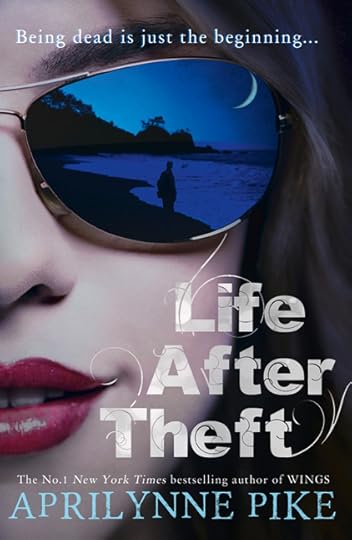 Jeff doesn’t get a very good first impression of his new posh school. This impression goes from bad to worse when the drop-dead gorgeous Kimberlee Shaffer, who literally dropped dead last year in the hallway of a Santa Monica High School, starts to pay him attention. After all, as he is the only person who can see her, he’s the perfect person to help her out, willingly or not.
Jeff doesn’t get a very good first impression of his new posh school. This impression goes from bad to worse when the drop-dead gorgeous Kimberlee Shaffer, who literally dropped dead last year in the hallway of a Santa Monica High School, starts to pay him attention. After all, as he is the only person who can see her, he’s the perfect person to help her out, willingly or not.
Unfortunately for Jeff, Kimberlee has some unfinished business. A lot of unfinished business. When Kimberlee was alive she was a kleptomaniac and she stole everything she could. Since she’s still on Earth she thinks by returning the things she stole she will be able to move on to wherever she is to go. So with Jeff helping her it should be easy.
Rather than be stuck with Kimberlee until he graduates, Jeff reluctantly agrees to help her. Until he discovers it’s easier to steal something than to bring it back.
This is a great book. I thought it was interesting and a bit weird, but in a good way. If it was me, I would have just dumped all the stuff at once and got the whole thing over and done with instead of returning the items one by one.
However, the story is about atonement and moving on with your life, or death, as Kimberlee finds out. The way Jeff and Kimberlee interact is fun, making this a great book for 12-16 year olds.
Thank you to the kind people at Harper Collins for our review copy.
RELEASE DATE: May 2013
For purchasing information on this book: CLICK HERE
ABOUT THE AUTHOR
Critically acclaimed, #1 New York Times best-selling author Aprilynne Pike has been spinning tales since she was a child with a hyper-active imagination. At the age of twenty she received her BA in Creative Writing from Lewis-Clark State College in Lewiston, Idaho. When not writing, Aprilynne can usually be found out running; she also enjoys singing, acting, reading, and working with pregnant moms as a childbirth educator and doula(labour coach). Aprilynne lives in Arizona with her husband and four kids; she is enjoying the sunshine.
Visit Aprilynne’s website here.


THE MIDWIFE’S TALE by Sam Thomas ★★★★
[image error] York in 1644 is not a pleasant place, even for an educated and wealthy woman such as Bridget. A civil war is splitting the country in two, and Parliament’s forces are at the city’s walls. In the midst of this uncertainty, one of Bridget’s friends is accused of murdering her husband, an act of petty treason. Esther Cooper begs Bridget to help prove her innocence and save her life.
Samuel Thomas has captured his female protagonist with a realistic hand, keeping her wit and wisdom fresh and believable. His enthusiasm for Reformation history keeps the story flowing without becoming bogged down in dreary details. Samuel based his character Bridget on a midwife by the same name who practiced in York and whose Will can found online at the Borthwick Institute for Historical Research website.
A mystery with a unique setting, The Midwife’s Tale is certainly a novel worth exploring, if you like facts along with your fiction.
Epic (3D) ★★★½
Reviewed by Alex (Aged 12) Meet Alex
Opens in Australia: July 4, 2013 USA: 24th May, 2013 UK: 22nd May 2013
Other Countries: Release Information
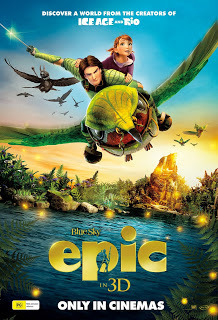 Epic begins with the character of Bomba, a determined professor, who studies a civilization of tiny people who he has never seen. Mary Katherine (MK) is his 17 year old daughter who one day is magically transported to this microscopic world where there is a battle going on between leaf men (good) and Boggans (evil).
Epic begins with the character of Bomba, a determined professor, who studies a civilization of tiny people who he has never seen. Mary Katherine (MK) is his 17 year old daughter who one day is magically transported to this microscopic world where there is a battle going on between leaf men (good) and Boggans (evil). Queen Tara passes on an important mission to MK which involves bringing the “chosen pod” to Nim Galuu, a wise caterpillar who can read ancient scrolls that hold the key to MK’s quest.
MK is joined by Nod, a rebellious teen, Ronin, a courageous and selfless leader of the leafmen warriors, and Mug and Grub, a slug and snail, who are guardians of the pods. Pods are important as they are needed to keep the forest alive.
Trouble comes when Mandrake, a fierce and mean leader of the Boggans, believes the forest belongs to the darkness. He has the power to destroy anything he touches. Only the power of the “chosen pod” can stop him which is why MK and her heroic team need to protect the pod.
The quality of the animation was impressive, especially in 3D, as it made it feel like you were in their world. The battle scenes are entertaining and action packed but some parts of the film were too slow. Bomba was my least favourite character as he annoyingly slowed the pace down with his absent mindedness.
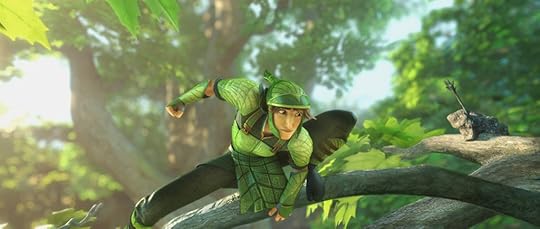
“Ugly says what?” “what?” “nothing…(Mug and Grub arguing). ” Mug and Grub were my favourite characters as they brought laughter to the movie. I also liked the character of Queen Tara as she had awesome powers which allowed her to control nature.
Epic holds within it a couple of messages – be respectful of the environment, and never stop believing in something just because you can’t see it.
The story-line was like the usual good versus evil scenario and I found it easy to follow. Epic has action, adventure, comedy, villains and heroes. Something for everyone.
June 30, 2013
Queen Alice’s Palaces – Juliette MacIver and Lucia Masciullo ★★★
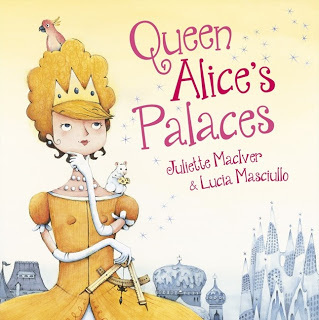 In ‘Queen Alice’s Palaces, Juliette MacIver demonstrates an imaginative creativity with her unique writing style. MacIver skilfully uses rhyme to weave a tale of the challenges Queen Alice and Sir Hugh face as each extraordinary palace is built.
In ‘Queen Alice’s Palaces, Juliette MacIver demonstrates an imaginative creativity with her unique writing style. MacIver skilfully uses rhyme to weave a tale of the challenges Queen Alice and Sir Hugh face as each extraordinary palace is built. MacIver uses a four-line stanza with every line rhyming except the fourth line. The ending of the fourth line in each stanza is identical so there is a constant ‘oo’ sound pattern throughout the read.
Lucia Masciullo’s visual portrayal of the different palaces and humorous characters, using magnificent colour and lines, brings the story alive. I’m definitely a fan of the illustrator’s work!
Sadly, my children (aged 4, 8 and 12) didn’t love the book as they didn’t appreciate the poetry style. However, with my school teacher cap firmly in place, I would recommend this lovely book for classroom use. Its uniqueness and clever use of rhythmical words is a great example to students of creative poetry. This book is well suited for primary school children.
THANK YOU to our most regal friends at HarperCollins Publishers Australia for our review copy.
On Sale in Australia: May 2013
Formats: Hardback | CLICK HERE FOR INFORMATION ON PURCHASING E-Book here: CLICK
ABOUT THE AUTHOR
I have always enjoyed writing, since I was a child, but I never aspired to the idea of Being A Writer, as such. I did always hope to write a children’s book or two at some stage, and when I finally did, I found it to be such marvellous fun that I decided being a writer was actually a splendid idea.
 I grew up in Wellington and went to Victoria University, where I completed a degree in linguistics, then a diploma in teaching English. I taught English on and off, working in-between as a cycle courier; in cafes; ushering at festivals; as a guide at the national museum; and as a travel agent (at which I was particularly hopeless). I also travelled around Thailand and Europe by myself. Finally, after a short spell in a government department, I left to become a fulltime mother of four children (who arrived in an orderly sequence, not all at once). This wonderful job has involved a vast amount of “market research” for my eventual evolution into a children’s author. Writing fits in (with a squeeze) around caring for my children, and I LOVE it to excess, so it is rather a perfect job for me.
I grew up in Wellington and went to Victoria University, where I completed a degree in linguistics, then a diploma in teaching English. I taught English on and off, working in-between as a cycle courier; in cafes; ushering at festivals; as a guide at the national museum; and as a travel agent (at which I was particularly hopeless). I also travelled around Thailand and Europe by myself. Finally, after a short spell in a government department, I left to become a fulltime mother of four children (who arrived in an orderly sequence, not all at once). This wonderful job has involved a vast amount of “market research” for my eventual evolution into a children’s author. Writing fits in (with a squeeze) around caring for my children, and I LOVE it to excess, so it is rather a perfect job for me.

April 15, 2013
A SHIFT IN POWER
A CONVERSATION WITH THE MODEST, SMART, HUGELY SUCCESSFUL HUGH HOWEY, AUTHOR OF THE 'WOOL' SERIES
If he was lucky, Hugh Howey thought his 2011 self-published science-fiction novella ‘Wool’ would sell five hundred copies. Instead, he has sold five hundred thousand, scored a seven-figure publishing deal, and had Twentieth Century Fox snap up the film rights with the iconic Ridley Scott possibly to direct.
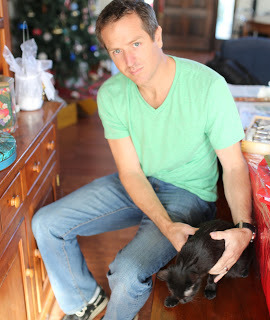 He thought he was just writing the sort of tale he wished already existed and he would then return to his other novels. But the enthusiastic demand from Amazon reviewers caused him to hurry back to his dystopian subterranean world to continue the story. Less than six months later he had released four more novelettes of varying lengths, the 550-page ‘Wool Omnibus’, which has since spent considerable time in the Amazon top 100 and was a #1 Bestseller in Science Fiction, and Winner of Kindle Book Review's ‘Best Indie Book of 2012’ Award.A modest Howey, who is passionate about the options available to authors through self-publishing, wants to make it very clear that this success story is about his choice to self-publish from the beginning. “It wasn't a matter of dealing with rejection and finally resorting to this. It was a choice from the get-go.” “The first thing an industry insider will think when they hear ‘self-publishing’ is that an author gave up on the query route. I don’t query my books. I haven’t since my first novel was published by a small press and I decided to publish the rest of my books on my own.” Howey claims it took “crazy” and “lots of guts” as opposed to “clever” to create the deal that “everyone in the industry was saying would never happen—ever.” His “brilliant” agent Kristin Nelson walked away from six-figure offers, and then seven-figure offers, to eventually strike a deal with Simon and Schuster to distribute ‘Wool’ to book retailers across the US and Canada. The deal, though, gave Howey full rights to continue distributing ‘Wool’ online in these territories himself. Normally, an author signs over all their territory distribution rights, which includes the increasingly lucrative e-book sales.Adds Howey, “We stuck to our convictions and we were doing well enough with foreign rights and film sales to not worry about what we were leaving on the table. To us, the goal was to get a different conversation going. And Simon and Schuster deserve all the credit for stepping up to the plate.”The deal has de-stigmatised the self-publishing door for other new and established authors to follow suit in taking control of their careers and their intellectual property. “Many authors are now seeing the benefit of earning money now rather than waiting years for a dream that may never materialize,” says Howey. “The route we take no longer signals the quality. It makes for an interesting time to be a writer.”
He thought he was just writing the sort of tale he wished already existed and he would then return to his other novels. But the enthusiastic demand from Amazon reviewers caused him to hurry back to his dystopian subterranean world to continue the story. Less than six months later he had released four more novelettes of varying lengths, the 550-page ‘Wool Omnibus’, which has since spent considerable time in the Amazon top 100 and was a #1 Bestseller in Science Fiction, and Winner of Kindle Book Review's ‘Best Indie Book of 2012’ Award.A modest Howey, who is passionate about the options available to authors through self-publishing, wants to make it very clear that this success story is about his choice to self-publish from the beginning. “It wasn't a matter of dealing with rejection and finally resorting to this. It was a choice from the get-go.” “The first thing an industry insider will think when they hear ‘self-publishing’ is that an author gave up on the query route. I don’t query my books. I haven’t since my first novel was published by a small press and I decided to publish the rest of my books on my own.” Howey claims it took “crazy” and “lots of guts” as opposed to “clever” to create the deal that “everyone in the industry was saying would never happen—ever.” His “brilliant” agent Kristin Nelson walked away from six-figure offers, and then seven-figure offers, to eventually strike a deal with Simon and Schuster to distribute ‘Wool’ to book retailers across the US and Canada. The deal, though, gave Howey full rights to continue distributing ‘Wool’ online in these territories himself. Normally, an author signs over all their territory distribution rights, which includes the increasingly lucrative e-book sales.Adds Howey, “We stuck to our convictions and we were doing well enough with foreign rights and film sales to not worry about what we were leaving on the table. To us, the goal was to get a different conversation going. And Simon and Schuster deserve all the credit for stepping up to the plate.”The deal has de-stigmatised the self-publishing door for other new and established authors to follow suit in taking control of their careers and their intellectual property. “Many authors are now seeing the benefit of earning money now rather than waiting years for a dream that may never materialize,” says Howey. “The route we take no longer signals the quality. It makes for an interesting time to be a writer.”
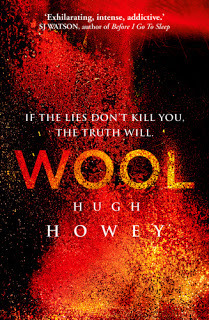 Howey suggest that self-publishing may actually be a smart career move. “Many authors are now skipping the years-long submission cycle and placing their stories directly in the hands of readers (and at incredible prices). Instead of manuscripts sitting around, they are collecting sales and building a fan base. Even a handful of sales are more than none. And time is spent writing the next work rather than shopping around the last one.”Much has been written about the poor quality of self-published books and whilst self-publishing is a great opportunity, the sheer volume of releases makes it difficult for readers to find gems that aren’t peppered with errors and novice mistakes. There is an expectation that a major commercial publisher will provide a superior read.Howey comments on this assertion, “I see typos in the first printing of major releases all the time. If you ask a reader if they’d rather have a book with two typos in it for $12.99 or one with ten typos for $2.99, I think they’ll go with the latter.” “All authors need to put out their best work possible, and Indies (independent authors) are no exception. But I do think they deserve a little more of a pass, just as an Indie rock band might release an album with some pops and static. It reminds you that you’re discovering something, not being handed something.”Instead of asking ‘How’s the writing?’ of an Indie book, Howey suggests the question should be: ‘How’s the story?’ “Readers care less about writing and more about gripping tales with unforgettable characters. The publishing industry is largely run by English majors who think we should care about pristine prose. They don’t understand the success of ‘Twilight’, Dan Brown, and E.L. James. They wish everyone was reading and discussing literary works. This is why they often miss out on books with wild potential.”“If you have to lean one way, it shouldn’t be towards the writing. And I say that, as someone who cherishes fine prose and agonizes over every one of my sentences. But only after I’ve crafted what I hope is an addictive story.”‘Wool’ is indeed one of those addictive stories. Set in a not-too-distant future, the story takes readers into the world of a Silo, home to thousands of descendants of the survivors of a sixty-year-prior cataclysmic disaster. Nobody remembers what happened but outside the Silo, the world is in ruin with air too toxic to breathe.
Howey suggest that self-publishing may actually be a smart career move. “Many authors are now skipping the years-long submission cycle and placing their stories directly in the hands of readers (and at incredible prices). Instead of manuscripts sitting around, they are collecting sales and building a fan base. Even a handful of sales are more than none. And time is spent writing the next work rather than shopping around the last one.”Much has been written about the poor quality of self-published books and whilst self-publishing is a great opportunity, the sheer volume of releases makes it difficult for readers to find gems that aren’t peppered with errors and novice mistakes. There is an expectation that a major commercial publisher will provide a superior read.Howey comments on this assertion, “I see typos in the first printing of major releases all the time. If you ask a reader if they’d rather have a book with two typos in it for $12.99 or one with ten typos for $2.99, I think they’ll go with the latter.” “All authors need to put out their best work possible, and Indies (independent authors) are no exception. But I do think they deserve a little more of a pass, just as an Indie rock band might release an album with some pops and static. It reminds you that you’re discovering something, not being handed something.”Instead of asking ‘How’s the writing?’ of an Indie book, Howey suggests the question should be: ‘How’s the story?’ “Readers care less about writing and more about gripping tales with unforgettable characters. The publishing industry is largely run by English majors who think we should care about pristine prose. They don’t understand the success of ‘Twilight’, Dan Brown, and E.L. James. They wish everyone was reading and discussing literary works. This is why they often miss out on books with wild potential.”“If you have to lean one way, it shouldn’t be towards the writing. And I say that, as someone who cherishes fine prose and agonizes over every one of my sentences. But only after I’ve crafted what I hope is an addictive story.”‘Wool’ is indeed one of those addictive stories. Set in a not-too-distant future, the story takes readers into the world of a Silo, home to thousands of descendants of the survivors of a sixty-year-prior cataclysmic disaster. Nobody remembers what happened but outside the Silo, the world is in ruin with air too toxic to breathe. Those living inside are bound by strict rules. One being you must never express the desire to go outside. Doing this, will automatically see you sent outside in a specially made suit to participate in what is known as a ‘Cleaning’. Unwise unfortunates as well as convicted criminals are sent to clean the one wall-screen allowing the inhabitants a view on the desolate world. Within minutes their suits break down and they are asphyxiated.The Silo is tiered with two hundred levels and maintains a systemised society of engineering, I.T., administration, food production and Government, all on different levels. ‘Wool’ begins the story with the Sheriff who has lost his wife to a ‘Cleaning’. But readers then move through the volumes to view the Silo habitat through the eyes of various characters including Juliette, an engineer who begins to question the values and rules of the system. Then the fun really begins.It is a grim, claustrophobic vision of the future and Howey admits he cannot be sure of the story’s origins but he shares that silos were always a part of his life. “My father was a farmer and had two large grain silos behind his barn that we played in and on top of.”“I also grew up in the Cold War Era and another type of silo was the missile variety. We practiced nuclear drills in grade school. People built bunkers. I took it as an axiom that people would one day live underground while a wasteland raged overhead.”The limited view of the outside world via the wall-screen is a central component of the story. “It came from my wariness of 24-hour news,” says Howey, “and what I fear a constant barrage of bad news does for our perception of the world. What if it really isn’t so bad out there? What if we’re bold enough to go see the world for ourselves?”In his own way, Howey has widened the perception of the self-publishing world, that outside the landscape of traditional publishing there is a richer world than initially imagined. He believes publishing opportunities are broadened with the two working together such as the publisher initiated idea with the Wool U.K. edition. The book contains the first chapter of the already e-published follow on series, ‘First Shift Legacy’, and concludes the free chapter urging readers to immediately purchase the already-available e-book, even though the print copy is yet to be released. “What’s great about this,’’ adds Hugh, “is that a major publisher embraced e-book availability before the print book was available! I’ve always thought this should be the case. It helps make for a stronger print debut. For proof, Wool hit #8 on the ‘Sunday Times Bestseller’ list in the U.K. upon release, almost unheard of for a debuting author. The only reason that was possible was because of the existing fan base and word-of-mouth generated by the e-book sales. I think publishers are doing the opposite of what’s good for their customers, their authors, and themselves, when they hold the e-book back in an attempt to protect hardback sales.”Whilst many authors complain of the deadlines imposed by their publishing contracts, Howey says, “I was the one who dictated the release schedule and told Random House (his U.K., Australian publisher) when I would have each book available. I have yet to sign a contract where someone demanded or expected a book from me at a particular time. The pressure to release multiple books swiftly has come from indie authors. We are making a great living off our work and enjoying the rapport with our readers. We just want that to continue.”
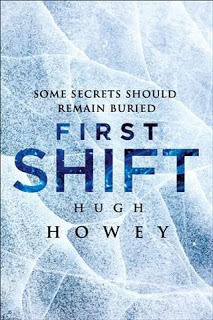 With his publishing success, Howey’s only complaint is that his wife misses him whilst he is whisked away from his South Florida home on long book tours through Europe, the U.K. and currently the U.S. The benefits though have outweighed the negatives, with the author now able to enjoy more free time at home after success saw him resign his day job as a bookshop employee. Even with the extra work load of his new found celebrity he still maintains his daily 2000 word-a-day count. “But it has meant some long days.” And if he were ever banished into a deserted silo with time on his hands, the busy author says he would read Shakespeare’s and Edgar Alan Poe’s complete works, and ‘Ulysses’, not because he thinks the latter is any good but he figures, “it’s the only way I’d ever read it. It took being stranded on an island to finally read ‘War and Peace’. No joke. I Loved it.”So many authors quote their indebtedness to their agents or publishers for their success but Hugh Howey, as one of the poster-children of the new social media and self-publishing phenomena, is adamant who is the major inspiration and support for him. It’s his readers. In ‘Wool’s’ Amazon Book description he writes, “Thanks go out to those reviewers who clamored for more. Without you, none of this would exist.”It may be, in the not-too-distant future that many successful self-published authors will leave a similar inscription in their Amazon sales pitch, but with one added line, “If not for Hugh Howey and his crazy courage, none of these stories would exist.”
With his publishing success, Howey’s only complaint is that his wife misses him whilst he is whisked away from his South Florida home on long book tours through Europe, the U.K. and currently the U.S. The benefits though have outweighed the negatives, with the author now able to enjoy more free time at home after success saw him resign his day job as a bookshop employee. Even with the extra work load of his new found celebrity he still maintains his daily 2000 word-a-day count. “But it has meant some long days.” And if he were ever banished into a deserted silo with time on his hands, the busy author says he would read Shakespeare’s and Edgar Alan Poe’s complete works, and ‘Ulysses’, not because he thinks the latter is any good but he figures, “it’s the only way I’d ever read it. It took being stranded on an island to finally read ‘War and Peace’. No joke. I Loved it.”So many authors quote their indebtedness to their agents or publishers for their success but Hugh Howey, as one of the poster-children of the new social media and self-publishing phenomena, is adamant who is the major inspiration and support for him. It’s his readers. In ‘Wool’s’ Amazon Book description he writes, “Thanks go out to those reviewers who clamored for more. Without you, none of this would exist.”It may be, in the not-too-distant future that many successful self-published authors will leave a similar inscription in their Amazon sales pitch, but with one added line, “If not for Hugh Howey and his crazy courage, none of these stories would exist.” Read my review of the sensational WOOL: Click here
READ MORE ABOUT HUGH
(Seriously you need to if you are a writer)
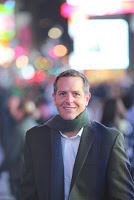
Hugh Howey is the author of Wool, a bestselling novel that has appeared in the top 5 of science fiction on Amazon. He is also the author of the award-winning Molly Fyde Saga. He lives in Boone, N.C. with his wife Amber and their dog Bella. Follow Hugh Howey on Facebook Sign up to receive Hugh Howey's newsletter Visit Hugh Howey's official website Follow Hugh Howey on Twitter
January 4, 2013
Much, much better than luck
A REVIEW
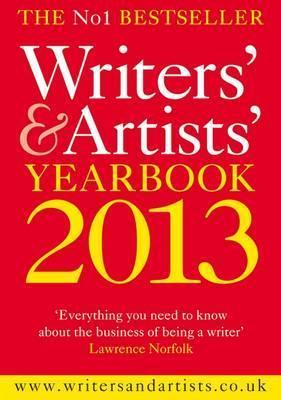 So, you’ve finished writing that book have you? It’s a hard slog. I know. I’ve written two myself and I know how time consuming, emotionally draining it can be, and how fabulously exciting it is to type ‘The End’. It’s like being on a big, scary, theme park ride. You’re having a great time, then a scary time, then a good time. If it’s one of those freaky swinging tall ones, then you may spend the whole time wishing it was over. Then suddenly it is over. Now you’re thinking, okay I have to make my way through the crowd to the next ride but I’m not sure where to go because it’s a big park and I’m not getting on that whiplash scary &^#@* ride again. No sirree. Well, I am going to break it to you gently. That roller coaster ride that has left you giddy whilst writing and editing your book until it is shiny like a diamond; that, my friend, was the easy bit. But you knew that didn’t you? You cannot attend a writing course or a workshop on publishing or read an article by a famous, successful author without hearing those wearying words. “It’s almost impossible to get published.” We know that. Yep. We do.
So, you’ve finished writing that book have you? It’s a hard slog. I know. I’ve written two myself and I know how time consuming, emotionally draining it can be, and how fabulously exciting it is to type ‘The End’. It’s like being on a big, scary, theme park ride. You’re having a great time, then a scary time, then a good time. If it’s one of those freaky swinging tall ones, then you may spend the whole time wishing it was over. Then suddenly it is over. Now you’re thinking, okay I have to make my way through the crowd to the next ride but I’m not sure where to go because it’s a big park and I’m not getting on that whiplash scary &^#@* ride again. No sirree. Well, I am going to break it to you gently. That roller coaster ride that has left you giddy whilst writing and editing your book until it is shiny like a diamond; that, my friend, was the easy bit. But you knew that didn’t you? You cannot attend a writing course or a workshop on publishing or read an article by a famous, successful author without hearing those wearying words. “It’s almost impossible to get published.” We know that. Yep. We do.
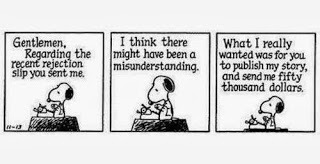 A few years ago, I attended a publishing workshop at a Writer’s Festival and by lunch-time most of the initially excited participants filed out totally transformed. They trudged towards the coffee shop, feet dragging and shoulders hunched. In huddled, dejected groups of despair they sat, staring at their cakes as the idea they had wasted years of their lives sank in. And whether you are the “I’ve been rejected too many times” author or an excited “Just finished my book and it’s really awesome” author, there may be something that will help with the toughest part of the job—chasing down an agent or a publisher. This is the part of the job where you need to remain diligent and determined and work smart.And here’s my little secret weapon for you. Get yourself a copy of the latest ‘WRITERS’ & ARTISTS’ YEARBOOK. The current copy is 2013. The blurb on the cover says, ‘Everything you need to know about the business of being a writer.’ And they weren’t exaggerating.
A few years ago, I attended a publishing workshop at a Writer’s Festival and by lunch-time most of the initially excited participants filed out totally transformed. They trudged towards the coffee shop, feet dragging and shoulders hunched. In huddled, dejected groups of despair they sat, staring at their cakes as the idea they had wasted years of their lives sank in. And whether you are the “I’ve been rejected too many times” author or an excited “Just finished my book and it’s really awesome” author, there may be something that will help with the toughest part of the job—chasing down an agent or a publisher. This is the part of the job where you need to remain diligent and determined and work smart.And here’s my little secret weapon for you. Get yourself a copy of the latest ‘WRITERS’ & ARTISTS’ YEARBOOK. The current copy is 2013. The blurb on the cover says, ‘Everything you need to know about the business of being a writer.’ And they weren’t exaggerating.
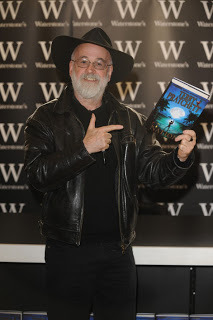 Inside is a treasure trove of up-to-date information. Terry Pratchett comments on the inside cover that it is ‘Much, much better than luck.’ It contains not only listings of addresses, emails, web addresses and phone numbers of literary agents and major publishers world-wide but also, newspapers and magazines. If your leaning is towards film and television scripting, poetry, art and illustration and even photography there are listings for you too. Also, there is a very helpful section of ‘Societies, prizes and festivals’ and even though this is aimed at the UK market, many competitions are open to overseas authors.But the real gems are the Notes from the authors. They are small essays from successful authors, like ‘Notes on becoming a novelist’ by William Boyd. Or ‘Notes from a successful fantasy author’ by Terry Pratchett (quite an understatement to call him merely successful). There are dozens of these type of essays from romance novelists to crime authors to J.K. Rowlings ‘Notes from a successful children’s author’ (again, it’s like calling a peacock a bird).Then there are sections about the publishing industry written by people
in
the publishing industry, that span ‘The state of commissioning’ to ‘Understanding publishing agreements’ to ‘Marketing, publicising and selling books’.And haven’t you always wanted to get inside the mind of a literary agent? Carol Blake, one of the U.K.’s foremost literary agents with a career that spans forty-nine years tells us ‘How to make a successful submission to a literary agent’. And we sure want to know that? Should you want to bypass the publishers and do it yourself there is even information on indie publishing with articles on ‘Print on demand’ and ‘Vanity publishing’.
Inside is a treasure trove of up-to-date information. Terry Pratchett comments on the inside cover that it is ‘Much, much better than luck.’ It contains not only listings of addresses, emails, web addresses and phone numbers of literary agents and major publishers world-wide but also, newspapers and magazines. If your leaning is towards film and television scripting, poetry, art and illustration and even photography there are listings for you too. Also, there is a very helpful section of ‘Societies, prizes and festivals’ and even though this is aimed at the UK market, many competitions are open to overseas authors.But the real gems are the Notes from the authors. They are small essays from successful authors, like ‘Notes on becoming a novelist’ by William Boyd. Or ‘Notes from a successful fantasy author’ by Terry Pratchett (quite an understatement to call him merely successful). There are dozens of these type of essays from romance novelists to crime authors to J.K. Rowlings ‘Notes from a successful children’s author’ (again, it’s like calling a peacock a bird).Then there are sections about the publishing industry written by people
in
the publishing industry, that span ‘The state of commissioning’ to ‘Understanding publishing agreements’ to ‘Marketing, publicising and selling books’.And haven’t you always wanted to get inside the mind of a literary agent? Carol Blake, one of the U.K.’s foremost literary agents with a career that spans forty-nine years tells us ‘How to make a successful submission to a literary agent’. And we sure want to know that? Should you want to bypass the publishers and do it yourself there is even information on indie publishing with articles on ‘Print on demand’ and ‘Vanity publishing’.
 WRITERS' & ARTISTS' YEARBOOK 2013 is 788 pages of information that you need to know with nearly 4,500 entries in its up-to-date directory of media contacts. You could spend a year full-time on the web, Googling, reading blogs and news articles in an attempt to work out how to get your work published. Or you can be smart and learn about the publishing industry from the publishing industry. Just sitting it on your desk near you is a reminder that there are many avenues to publishing your work. Somewhere in this beautiful, glossy book may be the essay that gives you the inspiration to send that umpteenth query letter that will bring back that answer they told you wouldn’t come. This book could be your ticket off those whirly, scary, rejection rides and onto a smooth train ride that will take you down the track to arrive at Station ‘Yes, we want your work’.My review copy of "Writers' & Artists' Yearbook 2013" thanks to the loveable people at
Bloomsbury Publishing Australia
WRITERS' & ARTISTS' YEARBOOK 2013 is 788 pages of information that you need to know with nearly 4,500 entries in its up-to-date directory of media contacts. You could spend a year full-time on the web, Googling, reading blogs and news articles in an attempt to work out how to get your work published. Or you can be smart and learn about the publishing industry from the publishing industry. Just sitting it on your desk near you is a reminder that there are many avenues to publishing your work. Somewhere in this beautiful, glossy book may be the essay that gives you the inspiration to send that umpteenth query letter that will bring back that answer they told you wouldn’t come. This book could be your ticket off those whirly, scary, rejection rides and onto a smooth train ride that will take you down the track to arrive at Station ‘Yes, we want your work’.My review copy of "Writers' & Artists' Yearbook 2013" thanks to the loveable people at
Bloomsbury Publishing Australia
To buy or learn more visit Bloomsbury's The Writers' & Artists' Year Book 2013
Published August 2013: RRP $39.99 in Australia.
Available Worldwide.
About Writers' & Artists' Yearbook 2013 from the Publisher
This bestselling guide to all areas of the media, now in its 106th edition, has been completely revised and updated. With 100 articles written by successful authors and publishing insiders, it advises, guides and inspires writers and artists on how to get published.The 2013 edition includes new articles on, amongst other topics, memoir writing, apps, libraries and contains a wealth of practical information on a huge range of topics including copyright, finance, submitting a manuscript and marketing yourself and your writing.With nearly 4,500 entries in its up-to-date directory of media contacts, the Yearbook is an in invaluable companion.
New articles for 2013 include:
Electronic publishing by Philip Jones
Notes from a successful romantic novelist by Katie Fforde
Writing for the theatre by David Eldridge
Why libraries matter by Maggie Gee
Writing for magazines by Hero Brown
Writing memoir by Irene Graham
The laws of privacy and confidentiality by Keith Schilling
'The one-and-only, indispensable guide to the world of writing' - William Boyd
'Everything you need to know about the business of being a writer' - Lawrence Norfolk
'Even established writers can feel as though they're climbing a mountain. Think of the Writers' & Artists' Yearbook as your sherpa' - Ian Rankin
'Full of useful stuff. It answered my every question' - J.K Rowling
'...much, much better than luck' Terry Pratchett
'...like a magic carpet that would carry the writer anywhere' Maeve Binchy
'... the book which magically contains all other books... an entrance ticket to the world you long for' - Fay Wheldon
December 27, 2012
Favourite Author talks: Elizabeth Gilbert
As I trawl the internet I keep finding these fabulous videos by writers. It certainly saves me from paying out my dollars and getting dolled up to see and hear them in person. Plus, remember I live in Perth, Western Australia (the most isolated city in the world) and, along with many big name bands, even authors don't visit here much.After downloading the podcasts on to my iPhone I usually listen whilst trucking around in my car. You learn a lot listening to these guys and I figure I really don’t need to hear that Rhianna song for the hundredth time. So, why not educate myself on the publishing industry via the people who know.What may surprise you is that many of these mega-stars of writerdom still face the same insecurities that novice writers face. Their words offer encouragement, wisdom and vision. Sometimes, they are simply inspiring and you can feel your fingers itching for that keyboard.I will keep putting up my favourite interviews as I come upon them, so check back regularly. And if any strike a chord, please leave a comment. That’s how we humble bloggers get paid.No, I don’t reach through and get into your wallet, I mean we are paid by the thrill of receiving a comment. So pay, people, pay with your words.
Your Elusive Creative Genius: Elizabeth Gilbert
Elizabeth Gilbert faced down a pre-midlife crisis by doing what we all secretly dream of—running off for a year. Her travels through Italy, India and Indonesia resulted in the mega-bestselling and deeply beloved memoir Eat, Pray, Love, about her process of finding herself by leaving home. She's a long-time magazine writer—covering music and politics for Spin and GQ—as well as a novelist and short-story writer. Her books include the story collection Pilgrims, the novel Stern Men (about lobster fishermen in Maine) and a biography of the woodsman Eustace Conway, called The Last American Man. Her work has been the basis for one movie so far (Coyote Ugly, based on her own memoir, in this magazine article, of working at the famously raunchy bar), and Eat, Pray, Love is on the same track, with the part of Gilbert played by Julia Roberts. Not bad for a year off.Gilbert also owns and runs the import shop Two Buttons in Frenchtown, New Jersey.
November 6, 2012
My Favourite Author Interviews - Neil Gaiman
As I trawl the internet I keep finding these fabulous videos by writers. It certainly saves me from paying out my dollars and getting dolled up to see and hear them in person. Plus, remember I live in Perth, Western Australia (the most isolated city in the world) and even authors don't visit here much.After downloading them on to my iPhone I usually listen whilst trucking around in my car. You learn a lot listening to these guys and I figure I really don’t need to hear that Rhiannon song for the hundredth time. So, why not educate myself on the publishing industry via the people who know.What may surprise you is that many of these mega-stars of writerdom still face the same insecurities that novice writers face. Their words offer encouragement, wisdom and vision. Sometimes, they are simply inspiring and you can feel your fingers itching for that keyboard.I will keep putting up my favourite interviews as I come upon them, so check back regularly. And if any strike a chord, please leave a comment. That’s how we humble bloggers get paid. No, I don’t reach through and get into your wallet, I mean we are paid by the thrill of receiving a comment. So pay, people, pay with your words.
Neil Gaiman at the Wheeler Centre
Click here for Video
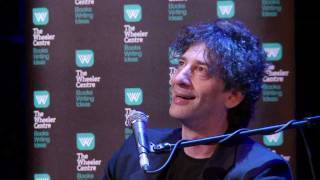 From Coraline to The Sandman and American Gods to Doctor Who, Neil Gaiman has made his mark by bringing fantasy and sci-fi from the fringe and into the spotlight. Gaiman joins Clem Bastow onstage to talk about his varied work, the tyranny of genre, sneezing baby pandas and red daleks.Gaiman’s conversation is lively and wide-ranging; he moves quickly from describing why he feels like a fraud to discussing why he’s not published in mainland China (and how a sneezing panda named Chu might change that). When Bastow asks him if he’s bothered by the effect genre prejudices may have on whether all of his work is read or not, he says that beginning as a comic writer, “every single possible prejudice that can be levelled at an area of the arts is levelled at you.” The breadth of his output is one of Gaiman’s most distinctive features. Speaking about his reluctance to be pigeonholed as a writer, he reveals that his restlessness stems from what he learned during early daysas a journalist interviewing other writers. He also describes how he tries to enter the storytelling process as openly as possible.Questions are invited early in the session, prefaced by Gaiman’s explanationof what he considers a question. Gaiman engages playfully with his audience, who ask questions about his inspiration for Neverwhere, his creative approach, his resistance to his work appearing in school curriculums, plot outlines and his knowledge of his characters.He’s queried on where his ideas originate — “the question that must not be asked of writers” — and elucidates the experience of writing for
Doctor Who
(“um… it was awesome!”). On weightier topics, Gaiman talks about the ideas behind his unconventional characterisation of deathand the kind of death he’d prefer to meet. He offers his thoughts on love and vulnerability and confesses that as a social creature, “writing is peculiarly lonely”. To close the evening, Gaiman slips his iPad onto his lap and reads a poem he wrote for an Australia Day event earlier in 2011. “There are so few places in the world that I could possibly read this poem,” he explains.
Click here for Video
From Coraline to The Sandman and American Gods to Doctor Who, Neil Gaiman has made his mark by bringing fantasy and sci-fi from the fringe and into the spotlight. Gaiman joins Clem Bastow onstage to talk about his varied work, the tyranny of genre, sneezing baby pandas and red daleks.Gaiman’s conversation is lively and wide-ranging; he moves quickly from describing why he feels like a fraud to discussing why he’s not published in mainland China (and how a sneezing panda named Chu might change that). When Bastow asks him if he’s bothered by the effect genre prejudices may have on whether all of his work is read or not, he says that beginning as a comic writer, “every single possible prejudice that can be levelled at an area of the arts is levelled at you.” The breadth of his output is one of Gaiman’s most distinctive features. Speaking about his reluctance to be pigeonholed as a writer, he reveals that his restlessness stems from what he learned during early daysas a journalist interviewing other writers. He also describes how he tries to enter the storytelling process as openly as possible.Questions are invited early in the session, prefaced by Gaiman’s explanationof what he considers a question. Gaiman engages playfully with his audience, who ask questions about his inspiration for Neverwhere, his creative approach, his resistance to his work appearing in school curriculums, plot outlines and his knowledge of his characters.He’s queried on where his ideas originate — “the question that must not be asked of writers” — and elucidates the experience of writing for
Doctor Who
(“um… it was awesome!”). On weightier topics, Gaiman talks about the ideas behind his unconventional characterisation of deathand the kind of death he’d prefer to meet. He offers his thoughts on love and vulnerability and confesses that as a social creature, “writing is peculiarly lonely”. To close the evening, Gaiman slips his iPad onto his lap and reads a poem he wrote for an Australia Day event earlier in 2011. “There are so few places in the world that I could possibly read this poem,” he explains.
Click here for Video
May 30, 2012
Throwing Imagination Out With The Bath Water
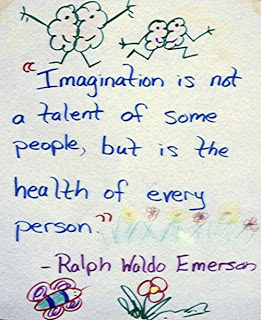 Imagination is a muscle. I know this because when I didn’t use it for years, in a storytelling way, it shrunk. For a long time, I couldn’t conceive a story idea even if it hit me in the head and wrote itself. And that lasted twenty plus years.Later, when I did throw myself into storytelling, it took months of writing, (the only story my mind possessed for the past ten years), before other small ethereal ideas began alighting upon me. My imagination was slowly awakening, and with that awakening began a trickle and then a flood of story concepts.
Imagination is a muscle. I know this because when I didn’t use it for years, in a storytelling way, it shrunk. For a long time, I couldn’t conceive a story idea even if it hit me in the head and wrote itself. And that lasted twenty plus years.Later, when I did throw myself into storytelling, it took months of writing, (the only story my mind possessed for the past ten years), before other small ethereal ideas began alighting upon me. My imagination was slowly awakening, and with that awakening began a trickle and then a flood of story concepts. They were everywhere and so abundant that I have now given up writing them down. No longer do I worry if I will run out of ideas. Instead, I worry if there is enough time left in my life to write all the good ones.A TRENDThis post isn’t about imagination or story ideas, though. It’s about a worrying trend—and it could be just me worrying—but did you know that narrative creative writing makes up less than fifteen per cent of the Australian English curriculum? Check in your own country, I imagine its' similar.Several teachers have recently informed me that the emphasis for literary education was in the writing skills needed in everyday life—persuasive writing, reporting, and letter writing. They told me that narrative writing would definitely be important for a writer to study, but that very few children were going to grow up to be writers. (They really should check Twitter. There seems to be millions on there).
 These reports and persuasive argument skills are the more important literary tools in the automated programming necessary for their University years, work and everyday life, they tell me. They are teaching them to write letters too. Even though, I don’t know anyone who writes personal letters, except my seventy-eight year old Aunty—and she doesn’t own a computer.I wonder though, if you have an encouraged, resilient imagination through creative writing wouldn't that translate into more interesting letters and reports? It worked for me. In a misguided attempt at an MBA, I received a distinction for an essay for which I had hardly researched—I had two babies at the time. The tutor commented, ‘I have given you this distinction not for the content because I’m not sure if you really nailed it. You score is for how much I enjoyed the read.’IN MY DAYIn the sixties and seventies, during my school years, narrative writing was all we did, interspersed with the occasional review of a book or poem. Of course, as you would expect of a writer, English was my favourite subject and the only reason I wanted to attend school. All the other subjects bored me and once I achieved a reasonable understanding of math I thought, well that will do me for life and I no longer listened. I flunked history and geography because, frankly, I couldn’t see the point. My cocky, fifteen-year-old self advised the poor cooking and sewing teachers that I did not need to learn to cook and sew because I would be rich and have servants. What an imagination. right? In German, I cut a deal with the teacher that as long as I passed then I did not have to attend class. Subsequently, I spent those lessons down by a creek near the school reading and writing. Had I attended school now, with this lack of emphasis on narrative expression, would I have seen writing as my future?
These reports and persuasive argument skills are the more important literary tools in the automated programming necessary for their University years, work and everyday life, they tell me. They are teaching them to write letters too. Even though, I don’t know anyone who writes personal letters, except my seventy-eight year old Aunty—and she doesn’t own a computer.I wonder though, if you have an encouraged, resilient imagination through creative writing wouldn't that translate into more interesting letters and reports? It worked for me. In a misguided attempt at an MBA, I received a distinction for an essay for which I had hardly researched—I had two babies at the time. The tutor commented, ‘I have given you this distinction not for the content because I’m not sure if you really nailed it. You score is for how much I enjoyed the read.’IN MY DAYIn the sixties and seventies, during my school years, narrative writing was all we did, interspersed with the occasional review of a book or poem. Of course, as you would expect of a writer, English was my favourite subject and the only reason I wanted to attend school. All the other subjects bored me and once I achieved a reasonable understanding of math I thought, well that will do me for life and I no longer listened. I flunked history and geography because, frankly, I couldn’t see the point. My cocky, fifteen-year-old self advised the poor cooking and sewing teachers that I did not need to learn to cook and sew because I would be rich and have servants. What an imagination. right? In German, I cut a deal with the teacher that as long as I passed then I did not have to attend class. Subsequently, I spent those lessons down by a creek near the school reading and writing. Had I attended school now, with this lack of emphasis on narrative expression, would I have seen writing as my future?
 Whether a child’s destiny is to become a writer or not, is not the point of narrative writing as a child. One of the most valuable tools a person needs, writer or not, is not mastery of the English language but imagination. And, for me, imagintion trumps all skills and education.My imagination, encouraged throughout my school years by creative writing exercises, has taken me further than being a writer. It helped me imagine distant lands I wanted to visit, which from age twenty I did and continue to do. It helped me see a business opportunity in my late twenties that became an exciting multi-million dollar success. Everything created within that business opportunity came, not from my education, but from my greatest asset, my imagination—an imagination fertilized most fervently whilst writing stories at schools.
Whether a child’s destiny is to become a writer or not, is not the point of narrative writing as a child. One of the most valuable tools a person needs, writer or not, is not mastery of the English language but imagination. And, for me, imagintion trumps all skills and education.My imagination, encouraged throughout my school years by creative writing exercises, has taken me further than being a writer. It helped me imagine distant lands I wanted to visit, which from age twenty I did and continue to do. It helped me see a business opportunity in my late twenties that became an exciting multi-million dollar success. Everything created within that business opportunity came, not from my education, but from my greatest asset, my imagination—an imagination fertilized most fervently whilst writing stories at schools. A LOSS?
 I am saddened to hear that our children will lose precious opportunities to utilise their imagination. This is particularly poignant in an era where the gift of imagining, and maybe not education, have delivered us Steve Jobs, who dropped out of college after six months and spent the next 18 months dropping in on creative classes. Then we have another imagination major, Steven Spielberg, who in 2002, after a thirty-five year intermission, finished his degree via independent projects at CSULB, receiving a B.A. in Film Production and Electronic Arts with an option in Film/Video Production. Hardly something he needed to do to continue his success.Since the emergence of man, stories have told our history and encouraged our future. Whilst we are preparing our children for their adult lives, could the educator’s also find a way to encourage their student’s dreaming lives?
I am saddened to hear that our children will lose precious opportunities to utilise their imagination. This is particularly poignant in an era where the gift of imagining, and maybe not education, have delivered us Steve Jobs, who dropped out of college after six months and spent the next 18 months dropping in on creative classes. Then we have another imagination major, Steven Spielberg, who in 2002, after a thirty-five year intermission, finished his degree via independent projects at CSULB, receiving a B.A. in Film Production and Electronic Arts with an option in Film/Video Production. Hardly something he needed to do to continue his success.Since the emergence of man, stories have told our history and encouraged our future. Whilst we are preparing our children for their adult lives, could the educator’s also find a way to encourage their student’s dreaming lives?
 These young people will all too soon spend a long time, as adults, writing their pragmatic reports and persuasive texts. Could we just allow them a few short years with their unicorns, wizards, pirates and fairies? Let us encourage their imaginations to flex and grow whilst they are young, so that one day they may not become a robot in a system, but a person who remembers imagining they were a robot and dreaming of saving the world.I leave you with Yeats…People who lean on logic and philosophy and rational exposition end by starving the best part of the mind. ~William Butler Yeats
These young people will all too soon spend a long time, as adults, writing their pragmatic reports and persuasive texts. Could we just allow them a few short years with their unicorns, wizards, pirates and fairies? Let us encourage their imaginations to flex and grow whilst they are young, so that one day they may not become a robot in a system, but a person who remembers imagining they were a robot and dreaming of saving the world.I leave you with Yeats…People who lean on logic and philosophy and rational exposition end by starving the best part of the mind. ~William Butler YeatsApril 9, 2012
Whos afraid of a little blank page?
 Fear, as defined by the Merriam-Webster dictionary, is “an unpleasant, often strong emotion caused by anticipation or awareness of danger.” Nobody needs to research the word to understand its meaning. We’re born with the understanding of it, as a necessity for our very survival. If not for fear, we would no doubt place ourselves in harm’s way often with serious consequences.So it was with interest I viewed recently on a
current affairs programme
, an interview with a fellow they nicknamed the Bird-Man. He jumps off mountains with flimsy looking, parachute-type wings, skims across the hillside at 200km per hour, and then lands in the valley thousands of metres below. As if that wasn’t dangerous enough, he, and his other crazy mate, place helium balloons a metre above the edge of cliffs, then aim and fly into them for that little extra thrill.
Fear, as defined by the Merriam-Webster dictionary, is “an unpleasant, often strong emotion caused by anticipation or awareness of danger.” Nobody needs to research the word to understand its meaning. We’re born with the understanding of it, as a necessity for our very survival. If not for fear, we would no doubt place ourselves in harm’s way often with serious consequences.So it was with interest I viewed recently on a
current affairs programme
, an interview with a fellow they nicknamed the Bird-Man. He jumps off mountains with flimsy looking, parachute-type wings, skims across the hillside at 200km per hour, and then lands in the valley thousands of metres below. As if that wasn’t dangerous enough, he, and his other crazy mate, place helium balloons a metre above the edge of cliffs, then aim and fly into them for that little extra thrill.
 In the documentary, one of the balloons had snagged on a stone and then only floated inches above the ground. So, of course, Bird-Brain-Man still needed to attempt bursting the precariusly low balloon. And in this case, he failed, skimming into the rock and hurtling off unconscious down the hillside.Miraculously, he did live to fly another day but endured series injuries but he has the full intention of recovering and doing it again. According to him, he suffers from a disorder called counterphobia, a pathological phobia to confront things that scare him. Now as much as I don’t want to hurl myself off a mountain—in fact, I get nervous walking down steps—I would like to get me some of that counterphobia for each time I experience the biggest thing that stands between me and writing.For twenty-three years, fear was a seemingly impenetrable wall, preventing me from embarking on a writing career. And even now, despite short story competition wins, and a building volume of published work, it is still there—large and looming.
In the documentary, one of the balloons had snagged on a stone and then only floated inches above the ground. So, of course, Bird-Brain-Man still needed to attempt bursting the precariusly low balloon. And in this case, he failed, skimming into the rock and hurtling off unconscious down the hillside.Miraculously, he did live to fly another day but endured series injuries but he has the full intention of recovering and doing it again. According to him, he suffers from a disorder called counterphobia, a pathological phobia to confront things that scare him. Now as much as I don’t want to hurl myself off a mountain—in fact, I get nervous walking down steps—I would like to get me some of that counterphobia for each time I experience the biggest thing that stands between me and writing.For twenty-three years, fear was a seemingly impenetrable wall, preventing me from embarking on a writing career. And even now, despite short story competition wins, and a building volume of published work, it is still there—large and looming.An Exercise in Control
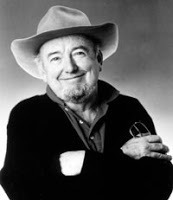
Thomas Keneally is clearly an accomplished author. He is the winner of the Man-Booker, Miles Franklin Awards, along with many others. He also enjoys the notable claim of having his book, “Schindler’s Ark”, adapted into an Oscar winning film by none other than Steven Spielberg. Certainly he should feel some confidence in his literary abilities.Recently, in a fascinating interview, he was asked that, considering his fairly early success, did writing come easily and did he worry was there any time that the writing might not come? He began to comment, ‘Writing is an exercise in control,’ and then he paused. I thought this incredible author, with such a legacy of prose, was about to extol the virtue of controlling yourself to sit at a desk day after day. That is the toughest part of the job right?After a long breath, though, he said something that truly surprised me. Award winning, Thomas Keneally said, ‘Writing is an exercise in controlling your fear. Above all the fear that you are not a writer. And that doubt is always there. But we are addicted to writing. Writing is like dope. It’s like alcohol to the alcoholic. You can’t do without it and alcohol makes alcoholics miserable and writing makes writers sometimes miserable but writing delivers a sort of transcendence sometimes.’
Wow.
Devil in my Ear
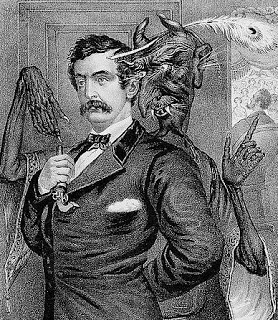 In my first year of taking writing seriously, that same fear sat next to me, whispering in my ear for every page I wrote. Sometimes it was so loud it drowned out all common sense and reassurances by my best first reader, Hubby. Even the wins in competitions and enjoying publication of my stories still managed to garner negative comment from my inner critic—he’s really quite malicious.'Surely, there weren’t many other stories in the competition,’ he would say, or ‘The quality for this particular competition must be very low for you to win a place.’ I wouldn't even hang the award certificates on my wall. He actually made me feel ashamed. As confident as I would feel at times, it was seemingly his job to bring me down, crash me on that mountain I dared to skim.Then there was that week, two years ago, where I didn’t dare read what I had written in a section of my novel. The memory of the writing, so punctuated with the thoughts that it wasn’t just trash but embarrassingly unfixable trash, paralysed me. That was the week I cried myself to sleep, couldn’t read, couldn’t write and decided I was never going back to it again.But the addiction called and at the back of my mind was the feeble, lonely thought that maybe, just maybe, it wasn’t as bad as I remembered. I thought if I just read one page and then put it away, then at least I would forever still the mad thought that I could be a good writer.
In my first year of taking writing seriously, that same fear sat next to me, whispering in my ear for every page I wrote. Sometimes it was so loud it drowned out all common sense and reassurances by my best first reader, Hubby. Even the wins in competitions and enjoying publication of my stories still managed to garner negative comment from my inner critic—he’s really quite malicious.'Surely, there weren’t many other stories in the competition,’ he would say, or ‘The quality for this particular competition must be very low for you to win a place.’ I wouldn't even hang the award certificates on my wall. He actually made me feel ashamed. As confident as I would feel at times, it was seemingly his job to bring me down, crash me on that mountain I dared to skim.Then there was that week, two years ago, where I didn’t dare read what I had written in a section of my novel. The memory of the writing, so punctuated with the thoughts that it wasn’t just trash but embarrassingly unfixable trash, paralysed me. That was the week I cried myself to sleep, couldn’t read, couldn’t write and decided I was never going back to it again.But the addiction called and at the back of my mind was the feeble, lonely thought that maybe, just maybe, it wasn’t as bad as I remembered. I thought if I just read one page and then put it away, then at least I would forever still the mad thought that I could be a good writer.The Demons
In the end, the writing wasn’t terrible and, of course, it was fixable, and I learnt a valuable lesson. Writing harboured its demons. Battling those demons was as much a part of the process as coming up with plots, inventing characters, and editing my drafts. Writing was a conscious and subconscious mind game.Ah, so now I knew the rules, I thought. That nasty critic voice will not catch me, the oh-so-wise writer, again. I was wrong.
 Two weeks ago, I began a short story with all the bravado with which my experience has endowed me. It was an exciting idea and the first few pages captured the concept perfectly. I read them enthusiastically over the phone to Hubby, who cooed and ahhed at my brilliance. That night I handed over the remaining pages eager to hear his thoughts on my work so far.‘It doesn’t work,’ he said bluntly. ‘The sentences are choppy and the whole opening scene drags. I’d scrub that beginning.’‘Oh, the whole beginning, doesn’t work. Are you sure?’ I said, puffs of ego escaping from every pore.‘Yep,’ he says, ‘See, you always accuse me of bias but when it’s not good I tell you. So now you can trust me.’ And that was all it took to keep me from writing for two weeks; to even spin me into a little sadness that permeated my life. In the night, that critic voice crept back in hissing like a snake, ‘You really aren’t much of a writer. Whatever muse you had has gone and found a better writer. Give up. You’ll amount to nothing.’For over two weeks it went on—critical voices, sadness, and no writing. But I’m a confirmed writerholic, and I couldn’t stay away. I opened the story file and stared at the screen as I took a deep breath. I didn’t dare read what I had already written. The literary critic had amped it up a notch and was screaming that the well was dry and best forget about it. 'You will never write another good sentence,' was his final shot.And I almost turned away.
Two weeks ago, I began a short story with all the bravado with which my experience has endowed me. It was an exciting idea and the first few pages captured the concept perfectly. I read them enthusiastically over the phone to Hubby, who cooed and ahhed at my brilliance. That night I handed over the remaining pages eager to hear his thoughts on my work so far.‘It doesn’t work,’ he said bluntly. ‘The sentences are choppy and the whole opening scene drags. I’d scrub that beginning.’‘Oh, the whole beginning, doesn’t work. Are you sure?’ I said, puffs of ego escaping from every pore.‘Yep,’ he says, ‘See, you always accuse me of bias but when it’s not good I tell you. So now you can trust me.’ And that was all it took to keep me from writing for two weeks; to even spin me into a little sadness that permeated my life. In the night, that critic voice crept back in hissing like a snake, ‘You really aren’t much of a writer. Whatever muse you had has gone and found a better writer. Give up. You’ll amount to nothing.’For over two weeks it went on—critical voices, sadness, and no writing. But I’m a confirmed writerholic, and I couldn’t stay away. I opened the story file and stared at the screen as I took a deep breath. I didn’t dare read what I had already written. The literary critic had amped it up a notch and was screaming that the well was dry and best forget about it. 'You will never write another good sentence,' was his final shot.And I almost turned away. Barely Hanging On
One thought kept me there, hanging by my creative fingernails. If I didn’t write that day, then I may not write tomorrow or the day after, and the longer the gap the more fear would fill it. Then one day might the gap stretch wider than I could reach. And the thought that I would never experience that ‘transcendence’ again, was just enough to tip my hands towards the keyboard.
 By now the critic was hysterical—I think I heard, terrible, disaster and horrific in the same utterance—as the first sentences left my mind and appeared upon the screen. Then, like magic, he was gone. And it was just the words and me again and I was back safe in my home.Later as I read the passages to my hubby, he exclaimed, ‘Brilliant, truly brilliant,’ and I was once again wearing my coat of many bravadoes. I thought, why, oh why, did the thought of writing scare me for two weeks? And I’ve thought a lot about it since, too, because this shouldn’t have happened to me again. I knew it would happen but like all writers, I’m counterphobic when it comes to writing. Sometimes, I even like the fear. It makes me feel all-conquering. So why did I lose my faith?
By now the critic was hysterical—I think I heard, terrible, disaster and horrific in the same utterance—as the first sentences left my mind and appeared upon the screen. Then, like magic, he was gone. And it was just the words and me again and I was back safe in my home.Later as I read the passages to my hubby, he exclaimed, ‘Brilliant, truly brilliant,’ and I was once again wearing my coat of many bravadoes. I thought, why, oh why, did the thought of writing scare me for two weeks? And I’ve thought a lot about it since, too, because this shouldn’t have happened to me again. I knew it would happen but like all writers, I’m counterphobic when it comes to writing. Sometimes, I even like the fear. It makes me feel all-conquering. So why did I lose my faith?Why, why, why?
Because it’s magic, you know. Writing is pure magic and we are magicians who instinctively weave with all our tools. And because it’s magic, there is no true formula. It doesn’t come from knowing that if you add one plus one you will always get two. It comes, and it doesn’t come; and it works, and it doesn’t work. Writers are even braver than the Bird Man. Even that Bird Man wouldn’t jump off a cliff if he thought there was a chance that his wings wouldn’t work. Sometimes, our wings don’t open. We don’t know what’s waiting for us counterphobic writerholics each day but we take our chances.
 We face our demons. We write to fight another day because there is only one thing worse than bad writing and that is no writing at all. And a life without writing scares me more than jumping off a cliff with only flimsy parachute wings.
We face our demons. We write to fight another day because there is only one thing worse than bad writing and that is no writing at all. And a life without writing scares me more than jumping off a cliff with only flimsy parachute wings.Susan May Official Website
- Susan May's profile
- 616 followers






